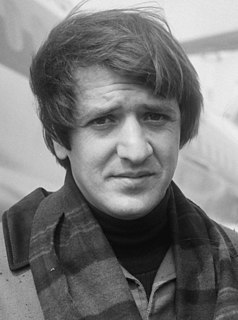A Quote by Jean Toomer
Once a man has tasted creative action, then thereafter, no matter how safely he schools himself in patience, he is restive, acutely dissatisfied with anything else. He becomes as a lover to whom abstinence is intolerable.
Related Quotes
Pleasure and pain at once register upon the lover, inasmuch as the desirability of the love object derives, in part, from its lack. To whom is it lacking? To the lover. If we follow the trajectory of eros we consistently find it tracing out this same route: it moves out from the lover toward the beloved, then ricochets back to the lover himself and the hole in him, unnoticed before. Who is the subject of most love poems? Not the beloved. It is that hole.
Once you have tasted the nectar of Silence, then whether your eyes are open or closed does not matter. Once you have tasted the nectar of that dimension, then it does not matter whether you are sitting in a room or working in an office or the kitchen or talking to people. The quality of aloneness, the quality of motionlessness, the quality of thoughtfreeness does not get affected by physical or verbal movement.
At one time I thought the most important thing was talent. I think now that the young man must possess or teach himself, training himself, in infinite patience, which is to try and to try until it comes right. He must train himself in ruthless intolerance-that is to throw away anything that is false no matter how much he might love that page or that paragraph. The most important thing is insight, that is to be-curiosity-to wonder, to mull, and to muse why it is that man does what he does, and if you have that, then I don't think the talent makes much difference, whether you've got it or not.
No matter how revolutionary something is, if you keep doing it over and over and over then it does loses it's excitement and it's high dynamics and people get used to ... get used to it like anything else you know um and then it just becomes a normal deal and then it becomes not very interesting at all.
One of the commonest causes of failure in Christian life is found in the attempt to follow some good man whom we greatly admire. No man and no woman, no matter how good, can be safely followed. If we follow any man or woman, we are bound to go astray. There has been but one absolutely perfect Man on this earth-the Man Christ Jesus. If we try to follow any other man we are surer to imitate his faults than his excellencies. Look to Jesus and Jesus only as your Guide.
So long as the bee is outside the petals of the lily, and has not tasted the sweetness of its honey, it hovers around the flower emitting the buzzing sound; but when it is inside the flower, it noiselessly drinks the nectar. So long as a man quarrels and disputes about doctrines and dogmas, he has not tasted the nectar of true faith; when he has tasted it, he becomes quiet and full of peace.
The man who fears to be alone will never be anything but lonely, no matter how much he may surround himself with people. But the man who learns, in solitude and recollection, to be at peace with his own loneliness, and to prefer its reality to the illusion of merely natural companionship, comes to know the invisible companionship of God. Such a one is alone with God in all places, and he alone truly enjoys the companionship of other men, because he loves them in God in Whom their presence is not tiresome, and because of Whom his own love for them can never know satiety.
Perfection. Excellence. What a passionate lover. But once having tasted the lips of excellence, once having given oneself to its perfection, how dreary and burdensome and filled with anomie are the remainder of one's waking hours trapped in the shackled lock-step of the merely ordinary, the barely acceptable, the just okay and not a stroke better.







































